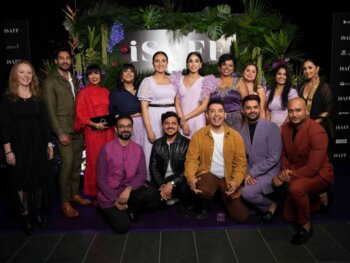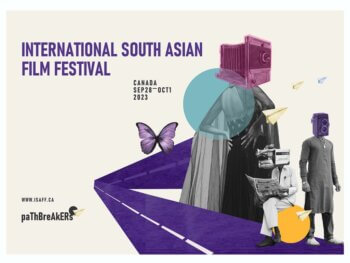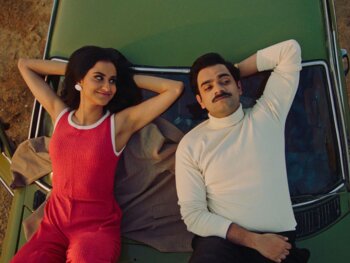
Documentarian Vinay Shukla Tells The Sobering Story Of Modern-Day Journalism in “While We Watched”
Entertainment Oct 20, 2022
Director Vinay Shukla arrived at TIFF 2022 with another timely, zeitgeist-grabbing documentary: While We Watched, wherein the Indian filmmaker sets out to chronicle the “lonely fight” that journalists take on in a world where budgets are disappearing, fake news is on the rise and reporters themselves are “dehumanized” by those in power. Centring on veteran Indian broadcaster Ravish Kumar, the doc nonetheless echoes the struggle of journalists across the globe — a dying breed whom, in our interview, Mr. Shukla likens to the musicians who stayed behind on the Titanic and continued to play, even as the ship went down.
First making waves in 2016 with acclaimed political documentary An Insignificant Man, Vinay Shukla now trains his camera on the decline of journalism, with a new doc called While We Watched. It’s a story told largely through the eyes of NDTV’s Ravish Kumar, a veteran Indian reporter standing up for the integrity of a field that’s under attack — in India and across the world. The powerful, harrowing film earned Shukla the Amplify Voices trophy at the Toronto International Film Festival this past September. Speaking with Anokhi Life during the fest, Shukla delved into the insidious disinformation campaign that’s been launched to discredit legitimate reporters, as budgets dwindle and news broadcasts devolve into spectacle-oriented shouting matches.
Matthew Currie: How has your festival experience been?
Vinay Shukla: Oh, it’s been fantastic. We have had two sold-out screenings. Our press and industry screenings have been very well-attended. Filmmakers spend four years in a cave, right? Then you come out and there are all these people who are greeting you and talking to you. So I am going through a bit of an out-of-body experience . . . but a good one.
MC: Speaking of the “four years in a cave” thing, are you at that point now where you’re so close to this film, so in the weeds, that you don’t even know what to think of it anymore? Because oftentimes, the longer a creator spends working on a project, the more its flaws are amplified and the things you love about it sort of melt away — to the point that don’t know if it’s good or bad anymore . . .
VS: I mean, for sure, it happens during the edit process. When you are editing so much, after a point you don’t know if you are making any sense. Because you set out, you had a structure in the beginning, and then every day you’ve chipped away at it and then the original plan has now shifted . . . and you’re wondering if it has the sort of meaning you wanted to convey. That sort of anxiety and uncertainty is a part of the edit process. But I do a vast number of screenings after our first stage, during the edit stage, so that takes care of some anxiety . . . I think the challenge is that by the time you bring the film out, there are so many more layers that get added to the film, because you need to get the messaging right, you need to make sure that people understand the film, you need to make sure that the viewers know what they feel, so there is a lot of layering that really happens at that point. So to answer your question very specifically, “Do you feel lost?” I don’t, but at the same time, I don’t know what I feel, exactly.
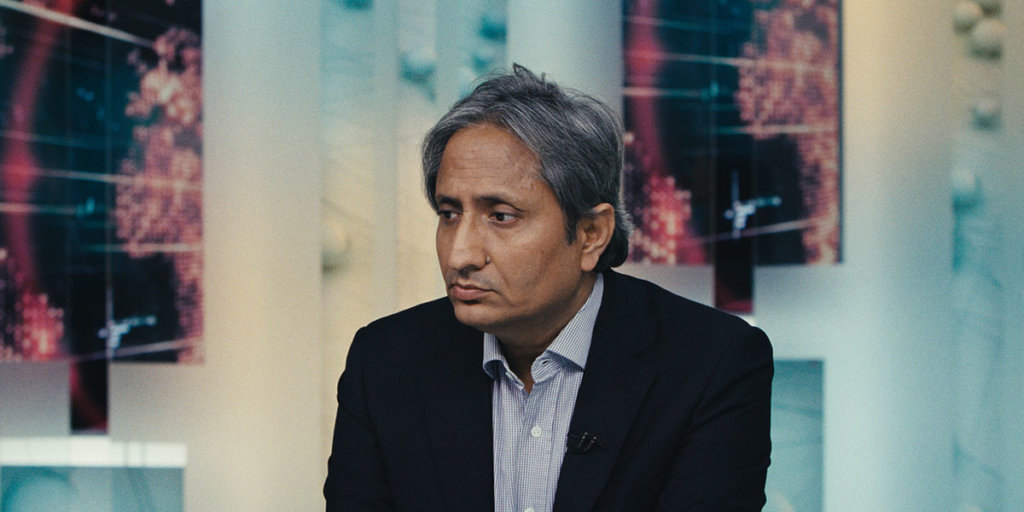
MC: Speaking again of the long, arduous process of making a film — it’s a massive undertaking, a massive personal commitment, no matter what the story or genre. What made you want to tackle this particular issue, the modern state of journalism?
VS: I mean, it’s not really the issue as much as the filmmaking of it. I have always been a fan of newsroom dramas. I love Spotlight, I love Aaron Sorkin’s The Newsroom, I love this film from Romania called The Collective. These are films that I could watch again and again. I have wanted to make a newsroom drama myself. The only difference was, a couple of years ago I stopped watching the news, because when I watched the news, it would make me very, very angry and very, very mentally disturbed. And this was the experience that, when I would speak to my friends across the world, they had stopped watching the news too; and they were like, “We are doing this for our mental health.” I realized that the films I had grown up on, in a way, were not telling the story that I was feeling as a consumer of news. I was feeling a lot of hopelessness, very disturbed. And I began wondering if the people who were creating the news feel the same way as I do. That was a point of enquiry that I began with. I came across Ravish [Kumar], who is the protagonist of my film. Ravish does a 9 p.m. broadcast every day in India, wherein he speaks to his audiences in Hindi, which is a much bigger language in India than English.
And his 9 p.m. broadcast is unlike the other primetime broadcasts in India. Most other broadcasts are a panel discussion-oriented thing. Spectacle. There will be anywhere between four and 15 guests trying to outmanoeuvre each other, trying to get themselves heard. Ravish, on the other hand, does a 9 p.m. broadcast which is a straight-to-camera monologue, which is full of reportage, it’s full of humour, he makes mistakes . . . but you see somebody who is trying to build the news every day as he goes forward. What I found very striking in those broadcasts is that he was a tired hero. He was somebody who would, in his broadcasts, tell people: “I know you guys don’t listen to me anymore, but I’m going to tell you what I need to say.” And I was like, “Wow, that’s a very harsh thing to tell your audience.” But people were still tuning in. There was a certain amount of public vulnerability that Ravish was subjecting himself to. He was wondering out loud if he himself is relevant. I kind of identified with that, so I decided to take the plunge and see what happens if I try shooting with him for a while.
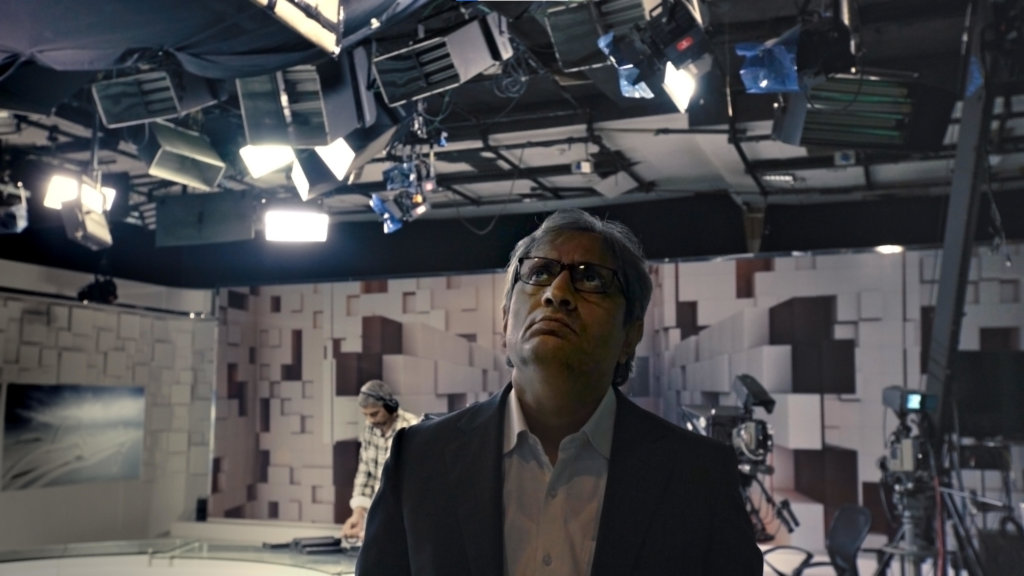
MC: How did your understanding of this issue, this world of journalism, change from your initial perception, over the course of making the film?
VS: Honestly . . . I don’t know what’s happening now here in Canada, but I know that the U.S. definitely feels that journalists have been dehumanized via a very massive disinformation campaign, wherein people don’t believe journalists, people believe that journalists are just paid hacks who were supposed to be the first-draft writers of history but they are the last-draft writers of press releases. That’s the sort of perception that has been [cultivated around] journalism.
When I began shooting this film, it was a revelation for me to understand the process of journalism, to understand how people are trying to build their story, how people are trying to chase their stories and trying to do their job right. It’s a very hard job. Journalistic heroes, the cost of their heroism is very often borne by their families; that was a revelation to me. How complex it is to run an organization which has 1,000 people on its payroll; that was a revelation to me. It’s a different kind of slow burn, wherein every day while you turn up there [to make this film], you understand the cost of doing journalism — the emotional cost, financial cost. Journalism can be a very solitary and a very lonely fight, especially if you are choosing to work against the mainstream — and that mainstream can be as simple as what people in your office think. So I tell people very often that this film is like the Titanic, but it’s not about Jack and Rose, it’s about the people who decided to stay back in the Titanic and continue playing their violins even when the ship was going down sinking, because they wanted to go out doing what they do best. This film is essentially about that spirit, and I discovered that spirit as I was shooting the film.
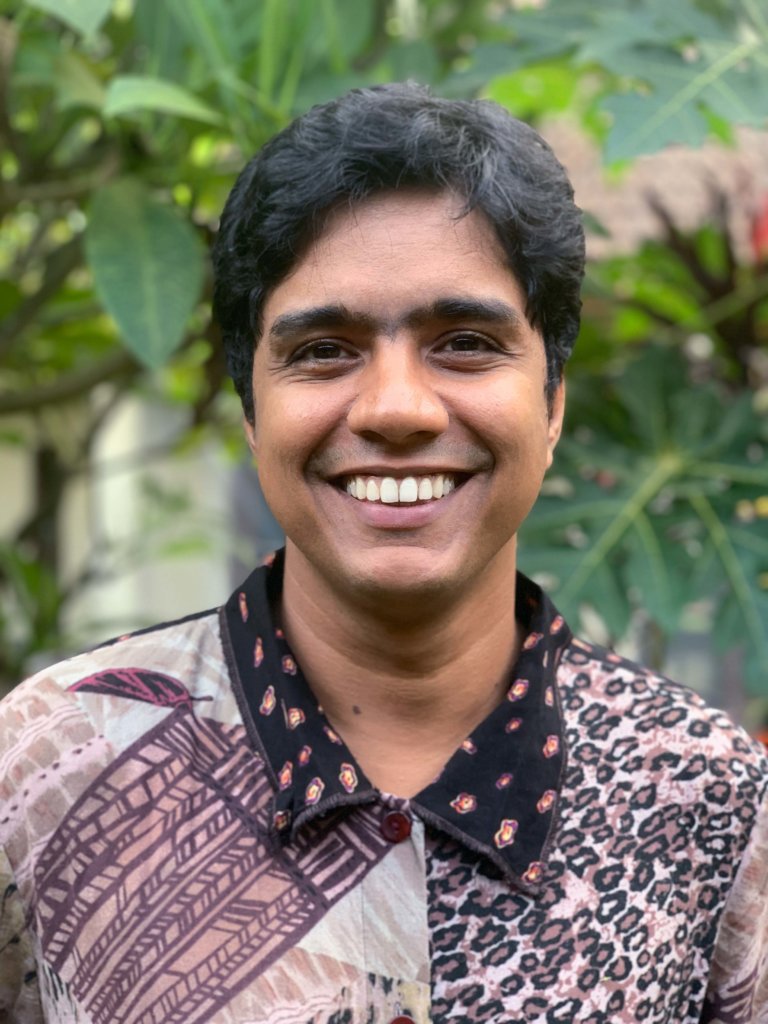
MC: I’m very interested in the way that a movie can be simultaneously specific to a country or a person, but also universal in terms of its resonance. Is that duality at play here? Is the story of journalism in India and the lonely fight that Ravish and reporters like him are fighting, recognizable and applicable around the world?
VS: You’re absolutely right, and this film is more about journalism than about, say, India. There is a very high cost to pursuing a kind of journalism that is not mainstream, and this can apply to various countries and various societies right now. It doesn’t matter if you’re ideologically on the right, centre, left, wherever . . . it’s becoming an increasingly hard fight. Journalists are increasingly finding themselves short on resources. Unless we figure out a way to build a better system, better systems across the world vis-à-vis journalism, this wave of disinformation that is doing a lot of [damage] . . . like, for example, what you saw in the U.S. with the capitol riots, where people went into Capitol Hill and they basically vandalized it because of a sense of entitlement they felt based on the information that they had consumed. You know that the disinformation campaign out there is huge. Unless we understand that we need to counter it very actively, we are in for trouble.
So it’s not just about India, it’s not even just about the U.S., this is happening across the world. There is a huge struggle. And I am not the first one to say this. A lot of people have been saying that we need to figure out financial models around journalism, we need to make sure that it becomes more sustainable, we need to talk about frameworks, we need to make sure that there is a strong community, that there are better rights for journalists . . . I could go on and tell you about everything that needs to get done in India, but each country has to understand that journalism is right now under attack by disinformation. There is no other way to see it, and we have to figure out how to fight back . . .
Main Image Photo Credits: LONO Studio & Britdoc Films
Matthew Currie
Author
A long-standing entertainment journalist, Currie is a graduate of the Professional Writing program at Toronto’s York University. He has spent the past number of years working as a freelancer for ANOKHI and for diverse publications such as Sharp, TV Week, CAA’s Westworld and BC Business. Currie ...





































































































